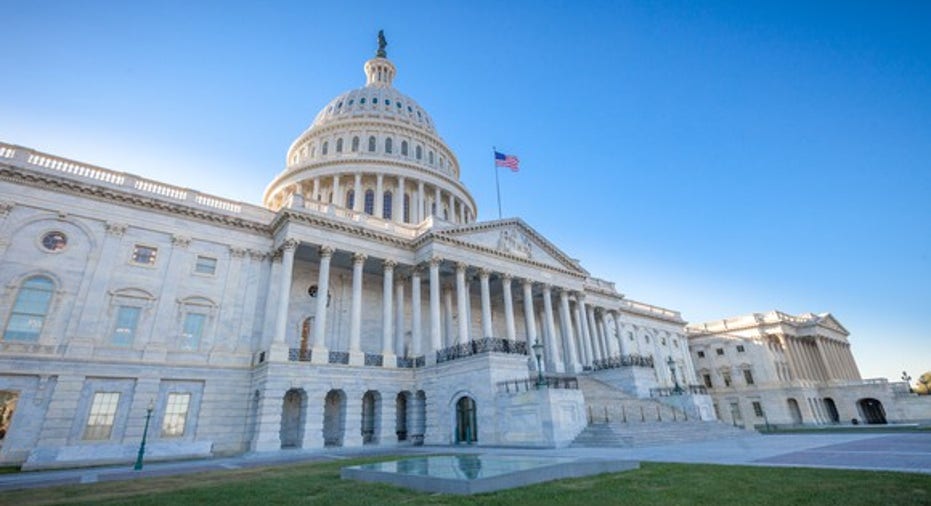Debt ceiling showdown, conservatives at odds on conditions for deal

As pressure mounts on congressional leaders to come to a consensus on raising the national debt ceiling by the September deadline, conservative lawmakers are working toward an agreement of their own on what they hope to see in a renewed debt ceiling package, FOX Business has learned.
In an attempt to show a unified front within the conservative wing of the Republican Party, Sen. Mike Lee (R-Utah) along with members of the House Freedom Caucus, including Chairman Mark Meadows (R-N.C), have had ongoing discussions throughout the August recess on the conditions they may request as part of raising the nation’s borrowing limit, according to congressional aides.
The two sides, though, have struggled to come to an agreement on which conditions they’ll demand from both House and Senate leadership when they return from recess, according to those familiar with the matter.
On the one hand, members of the Freedom Caucus have indicated they would prefer to see the end of the Affordable Care Act’s cost-sharing reduction payments, which are government subsidies made to health insurance companies to offset some of their costs for providing discount health care plans to those in the lower-income bracket.
On the other hand, conservative senators, including Lee, are hoping to see major cuts to government spending or reforms to the budget as a condition to gain their support in raising the debt ceiling. The inclusion of the REINS Act, a form of legislation that requires every new regulation that costs more than $100 million to be approved by Congress, is also a possible path to a solution.
A spokesman for Lee declined to comment. A spokeswoman for the House Freedom Caucus did not return calls for comment.
However, in May, Meadows and the Freedom Caucus declared they would oppose any clean raising of the debt ceiling and an increase has to be connected to legislation that addresses government spending.
“We oppose any clean raising of the debt ceiling… We demand that any increase of the debt ceiling be paired with policy that addresses Washington’s unsustainable spending by cutting where necessary, capping where able, and working to balance in the near future,” Meadows said at the time, in a statement.
The debt ceiling is currently at the limit of $19.8 trillion, which covers the U.S. Treasury to borrow money from the public and government agencies. Treasury Secretary Steven Mnuchin has warned Congress numerous times that if it can’t extend the debt ceiling before Sept. 29, the United States will be unable to pay its bills and could trigger a global financial crisis.
Another debate between lawmakers from both sides of the aisle is the mechanism in which the debt ceiling will be raised. It was originally thought that Congress could extend the country's borrowing limit through a Veteran Affairs (VA) bill, but the discussions never progressed to anything substantial.
In a tweet on Thursday, President Donald Trump indicated he too was in favor of pairing a VA bill with debt ceiling legislation and blasted GOP leadership for not moving ahead with the original plan.
“I requested that Mitch M & Paul R tie the Debt Ceiling legislation into the popular V.A. Bill (which just passed) for easy approval. They didn't do it so now we have a big deal with Dems holding them up (as usual) on Debt Ceiling approval. Could have been so easy-now a mess!” Trump tweeted.
I requested that Mitch M & Paul R tie the Debt Ceiling legislation into the popular V.A. Bill (which just passed) for easy approval. They...
— Donald J. Trump (@realDonaldTrump) August 24, 2017
...didn't do it so now we have a big deal with Dems holding them up (as usual) on Debt Ceiling approval. Could have been so easy-now a mess!
— Donald J. Trump (@realDonaldTrump) August 24, 2017
Mnuchin on Friday continued to insist the White House is confident the debt ceiling will be raised, but wasn’t specific on any concessions that may be required.
"My strong preference is that we have a clean debt ceiling [increase], but the most important issue is the debt ceiling will be raised in September,” Mnuchin told reporters at the White House. "I have had discussions with the leaders in both parties in the House and Senate and we are all on the same page. The government intends to pay its debts and the debt ceiling will be raised."



















